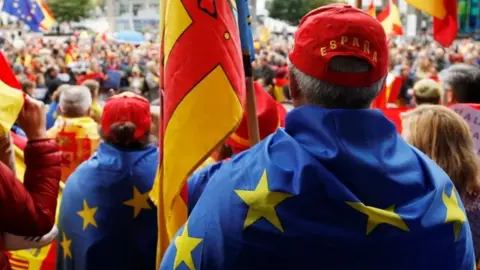Catalonia independence bid: EU warns of 'more cracks'
 Reuters
ReutersThe EU faces the danger of "more cracks" appearing in the bloc following Catalonia's declaration of independence from Spain, a top EU official has said.
"I wouldn't want the EU to consist of 95 states," European Commission President Jean-Claude Juncker said.
Meanwhile, European Council President Donald Tusk said Spain "remains our only interlocutor" in the crisis.
Spain's parliament earlier responded to Catalonia's move by approving direct rule over the autonomous region.
On Friday evening, Mr Juncker warned that the 28-member EU did not need "any more cracks, more splits".
"We shouldn't insert ourselves into what is an internal debate for Spain," he added.
Separately, Mr Tusk expressed hopes that "the Spanish government favours force of argument, not argument of force".
The British and French governments as well as the French president all voiced support for the central Spanish government in Madrid.
However, a statement by a minister in Scotland's devolved government said: "We understand and respect the position of the Catalan government.
"While Spain has the right to oppose independence, the people of Catalonia must have the ability to determine their own future."
The EU sees itself as a stabilising and unifying force in Europe, and there is no sign that its instinctive aversion to separatism and secession will waver as the crisis intensifies, the BBC's Kevin Connolly in Brussels says.
How did the crisis develop?
After a referendum on 1 October, Catalan leader Carles Puigdemont signed a declaration of independence - but delayed implementation to allow talks with the Spanish government.
A deadline set by Madrid for him to clarify his intentions came and went, prompting Spanish Prime Minister Mariano Rajoy to announce plans to impose direct rule, using Article 155 of Spain's constitution.
On Friday, the Catalan parliament voted to declare independence.
Minutes later, Spain's Senate backed direct rule over the region.
Catalonia is one of Spain's richest, most distinctive regions and has enjoyed a high degree of autonomy.
But many Catalans feel they pay more to Madrid than they get back, and there are historical grievances too, in particular Catalonia's treatment under the dictatorship of General Franco.

